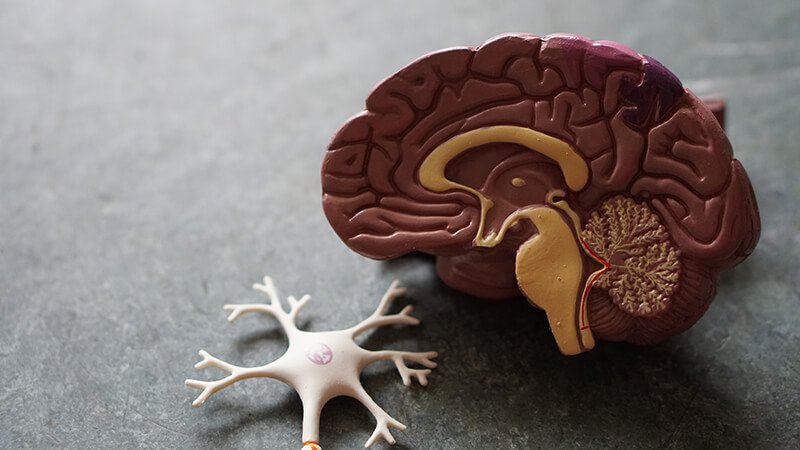As meditation has been in the mainstream for several years now, it’s received a lot of attention, including attention from skeptics. While part of this is due to how meditation is marketed sometimes, and even exaggerated when it comes to the scientific benefits of meditation, this attention has produced many studies as a result of the claims made and skeptics. The scientific benefits of meditation are now beginning to be understood.
That being said, the science around the benefits of meditation is still new since it hasn’t been studied or looked at intently up until very recently. However, the papers that have been published and the research that has been done around the various techniques and hypotheses around meditation is very promising.
We did some homework and put together a collection of studies that will show 100 scientific benefits of meditation.
Categories
Brain Benefits

1. Increase in gray matter
Gray matter is the darker tissue in the brain that consists of nerve cells. The current understanding of gray matter is that the more of it a person has, the more intelligent a person or animal is. Research done around mindfulness and gray matter suggests that meditation may change the amount and pattern of gray matter on the brain.
2. Increase in brain waves
A study done by the University of Wisconsin found that Zen Buddhist monks showed an increase in beta waves and an increase in the intensity of gamma waves.
3. Changes in precuneus
The precuneus is the part of the brain that is generally associated with the function of the brain that manages mental images concerning the self and memory. A study found that meditation changed the structure of the precuneus.
4. Increase in thickness of the corpus callosum
The role of the corpus callosum is to connect the two hemispheres of the brain. Scientists believe that the function of this part of the brain is around motor, sensory, and cognitive performances between both regions. A study found that meditation increased the thickness of the corpus callosum.
5. Changes in the amygdala
The amygdala is an almond-shaped cluster of neurons that is responsible for regulating emotions, survival instincts, and memory. Research around meditation and stress reduction showed that participants had structural changes to their amygdala after practicing mindfulness for eight weeks.
6. EEG activity slows
EEG activity is the electrical and brain wave activity in the brain. Research around different meditation states and EEG, ERP, and neuroimaging studies found that meditation slowed down EEG activity from the brain.
7. Neuroplasticity
Neuroplasticity or neural plasticity is the brain’s ability to continuously change in response to new information, behaviors, and stimulation. It’s the general idea that even as you get older, it’s still possible for your brain to change and grow with new ideas. A study found that meditation influences the brain’s neuroplasticity and can help with the development of the brain.
8. Slows down aging and brain atrophy
Research around gray matter in the brain and meditation found that regular meditation had the potential to slow down aging in the brain and gray matter atrophy from aging. Of the scientific benefits of meditation, changes in gray matter seem to be reported as the most common.
9. Increases hormones that protect telomeres
Telomeres are the ends of a chromosome, which are designed to protect genetic data. As people age, these telomeres get shorter, and this has been shown to cause aging and increase people’s risk of cancer and death. Research around meditation and aging showed that meditation could increase the release of hormones that protect telomeres and, in turn, slow down aging.
Cognitive Benefits

10. Increased focus
Research shows that the long-term effects of a regular meditation practice include improving overall cognition and focus. In fact, just four days of meditation showed an increase in people’s ability to maintain their attention.
11. Ability to work under stress
Meditation is a great tool for people that work in high-stress environments. A 16-week study looking at mindfulness for executives found that meditation was able to help participants better manage their workplace stress as well as working under stress.
12. Better information processing
With enough meditation practice, you can become better at processing information. In a study that measured participants’ abilities to process an uptake of information, meditators showed an enhanced depth of processing information and sequencing information they received in the study.
13. Better decision making
Research around decision making and meditation found that meditation allowed introspection that enabled participants to make more rational decisions when they played an ultimatum game after meditating.
14. Improved learning capability
Meditation helps the brain respond better to feedback, and thus, makes it easier to learn something new. In a study in the Journal of Cognitive, Affective & Behavioral Neuroscience, researchers found that participants, after having meditated, were better at learning and retaining information after receiving feedback.
15. Improved memory
Meditation has been shown to improve memory and memory recollection in adults as well as in young adults. When participants practiced mindfulness meditation, researchers noticed an increase in their working memory capacity compared to the control group. Learn more about how meditation improves memory.
16. Increase in self-awareness
Self-awareness is described as a conscious perception of one’s own personality, strengths, weaknesses, and motivations. A study published in Social Cognitive and Affective Neuroscience showed that when participants did an eight-week course on mindfulness meditation, researchers saw an increased level of attention on the present and an increased level of self-awareness.
17. Creativity
Research done into meditation and creativity showed that participants that did brief mindfulness meditation training saw a positive influence on creativity.
18. Prevention of Alzheimer’s
Alzheimer’s is the most common cause of dementia, characterized by memory loss and loss of important cognitive abilities that help with day-to-day living, that many people take for granted. Meditation is a tool people can use to help decrease the risk of Alzheimer’s according to research done with a 12-week meditation training program.
19. Improved levels of introspection
People with improved levels of introspection generally know themselves better. Improved levels of introspection allow you to learn from your mistakes and understand your strengths, weaknesses, motivations. Researchers found that people who meditate regularly have higher levels of introspection, and long-term meditators have more introspective accuracy than people who don’t meditate.
20. More self-reflection
People who are more self-reflective are better able to manage life anxiety and an improved sense of well-being. Studies show that people who meditate have more self-reflective experiences and are more self-reflective overall. When looking at the scientific benefits of meditation, researchers also looked at anxiety levels.
21. More optimistic perspective on life
In a study measuring optimism comparing people who meditate to people who do not meditate found that levels of optimism were significantly higher among the group that meditated compared to the group that didn’t.
22. Improved academic performance
In a study that attempted to see the effects of meditation on academic performance, it found that students that practiced meditation had a higher cumulative GPA compared to the students that didn’t meditate. The group that meditated had a mean GPA of 2.77, whereas the group that didn’t had a mean GPA of 2.64.
23. Improved attention span
Researchers have found that mindfulness meditation helps modify the subsystems of the mind that control attention.
In a randomized controlled trial with older adults, researchers saw improvements in memory function of those that practiced meditation and listened to music. The participants meditated for 12 minutes a day for 12 weeks in this trial.
25. Prevents dementia
A study conducted to investigate how mindfulness affects cognition found a significant reduction in cognitive decline and an increase in blood flow to the brain and areas of the cortex of those that practiced mindfulness meditation.
26. More cognitive flexibility
Cognitive flexibility is the ability to change between two different mental concepts as well as think about two different mental concepts at the same time. A study investigating the relationship between meditation and cognitive flexibility found that mindfulness is linked to improvements in cognitive flexibility.
27. More sustained attention
Sustained attention is the ability to focus on one specific task for a sustained period of time. Generally, this type of attention is useful for students and tasks such as programming or writing. In a study determining the relation between mindfulness and sustained attention, researchers found mindfulness meditation might be associated with improved sustained attention.
Meditation for focus: See the concentration benefits of meditation for yourself. We have a free guided meditation practice you can follow to improve your focus.
28. Higher levels of selective attention
Selective attention is the ability to selectively filter out distractions and focus on just one thing despite the overload of sensory information. People with lower levels of selective attention tend to become overwhelmed by information or can have mental meltdowns. Researchers found that meditation can help with improving selective attention.
29. Increase in mindfulness
Mindfulness is best explained as a non-judgmental awareness of the present moment. Naturally, people who practice mindfulness meditation have been shown to be more mindful throughout their day to day lives.
30. General elevated state of alertness
Researchers have found that participants in a study that practiced Transcendental Meditation experienced a state of “restful alertness.” Of the scientific benefits of Transcendental Meditation, this state of “restful alertness” was commonly observed.
31. Increased productivity
More companies are incorporating (no pun intended) mindfulness and meditation into the workplace. Not only can it help with the mental health of employees and executives, it has shown to help with performance and productivity in the office.
32. More clarity
Mental fog can make you feel like a zombie. Studies are showing the practicing meditation helps people think clearer and have a more general state of clarity throughout the day.
33. More discipline
Researchers have found the mindfulness meditation is related to an increase in gray matter in the brain. Increases in gray matter mean an increase in will power, which can help with keeping discipline or building discipline.
34. More resilience
Resilience is the ability to withstand emotional stress without breaking under it. A study investigating the relationship between Kundalini-inspired meditation and cognitive function found that when participants trained for 12 weeks, as well as with a 24-week follow-up, the participants were much more resilient from emotional stress.
35. Ability to better grasp abstract information
Researchers that saw an increase in gray matter density in the amygdala resulting from meditation noted that participants were able to better grasp abstract information.
36. Improved motor and language skills
This same study shows that the increase in gray matter density in the amygdala among meditators was also correlated to an improvement in motor and language skills.
37. Improved perception
While we take our vision for granted, our vision depends on our cognitive functions. In addition, we sometimes forget how important our vision and perception is, and how often we fall for visual illusions. In a study investigating the relationship between meditators and perception, it found that long-term meditators had an improved perception compared to novice meditators.
38. Better mornings and waking up
In a study that looked at Buddhist meditation and Buddhist meditation practices, it found that participants that practiced Buddhist meditation regularly, had much better wakefulness as a result of neuroplastic changes to the brain, creating more efficient information processing in the morning.
39. Decrease in ruminative thoughts
Ruminative thoughts can be described as thoughts that enter your mind, seemingly out of nowhere, that causes you to worry or stress about the past or something that happened to you. Researchers looking at understanding the relationship between mindfulness meditation and aging found that participants practicing during the trial had a decrease in ruminative thoughts.
40. Shift in perceiving things as threats to challenges
In the same study, researchers observed participants shifting their perception of things from threats to simply challenges. This is a much more constructive and useful way of looking at and tackling different situations.
41. Positive thinking
A study that looked at the scientific benefits of Rajayoga Meditation observed that participants that practiced on positive thinking enhanced their overall positive thinking. The practice, which is focused on attaining higher levels of happiness, was shown to scientifically and significantly increase positive thinking regardless of the age and experience of the meditators.
42. Dissolution of perceived body boundaries
Researchers that looked at the effects of body scan meditations found that participants had a dissolution of their perceived body boundaries. The dissolution of perceived body boundaries is noticing your consciousness as a perception of inputs and experiences, not the experiences and inputs themselves. Noticing that you simply are a witness to the experiences can help build more selflessness and break from your ego.
Emotional Benefits

43. Emotional intelligence
Emotional intelligence is awareness and control of how a person expresses their emotions as well as their ability to empathize more easily with other people. Researchers looking at the scientific benefits of mindfulness meditation found that there was significant evidence showing that participants that practiced mindfulness meditation showed greater levels of emotional intelligence.
44. Increase in empathy
Empathy, which is the ability to understand the feelings of another person, was shown to increase when participants in a study practiced loving-kindness meditation. After a six week trial, all participants experienced various levels in statistical increases in empathy.
45. Positive relationships
Researchers looking at loving-kindness meditation found an increase in social connectedness and positive relationship building among participants in the study. Even just a few minutes of loving-kindness meditation before an interaction with a partner showed increased feelings of social connection and positivity.
In another study looking at the relationship between loving-kindness meditation and social connectedness, it found that participants in the study saw a decrease in their feelings of social isolation.
47. Improved levels of compassion
In a nine-week randomized controlled trial, researchers saw improved levels of compassion and self-compassion among participants that practiced meditation.
48. More patience
Researchers found that short-term meditation training improves attention and control, and thus a person’s patience, compared to a group in a study that received relaxation training.
49. Improved self-esteem
A study that looked at meditation for adolescents found that meditation was an effective way to help improve the student’s self-esteem, among other things. This is due to providing students a way to assist them when dealing with challenges in school and at home, as well as a coping mechanism that also improves their self-awareness.
50. Forgiveness
According to 5 different studies around mindfulness and forgiveness, mindfulness and meditation are helpful when it comes to increasing one’s level of forgiving tendencies. This is due to making people much more open-minded and accepting, as well as increasing their levels of empathy.
51. Emotion regulation
Mindfulness meditation has demonstrated in a few studies that with regular practice, it can help one regulate and manage their emotions a lot better. When practiced with other forms of mindfulness, it can help those who struggle to keep their emotions in check.
52. Euphoria
Through regular meditation practice, people can increase the levels of serotonin and dopamine in their bodies, and thus create euphoria-inducing states by simply meditating. These are the same parts of the brain that are activated during sexual activities, listening to music, and even taking drugs.
53. Decrease in apathy
A study found that during a nine-month meditation training period, researchers saw physical changes to the brain and limbic system, which can help with motivation and reducing apathy, in particular, those experiencing depression or PTSD.
54. Anger management
Researchers looking at 29 highly angry participants found that groups that were taught meditation saw an improvement in their anger management as well as their negative thoughts. The no-meditation group saw no change in their anger across different situations. In terms of the scientific benefits of meditation for counselors, this research is encouraging.
55. Happiness
A study published by Middle Tennessee State University found that participants that meditated as little as three or fewer times a week saw an improvement in their overall happiness, and participants that meditated more than three times a week saw a significant improvement in their happiness and well-being.
56. Improved levels of self-satisfaction
Participants in a study involving Rajayoga Meditation found that when compared to a similar group of non-meditators, they were overall much more self-satisfied.
57. More self-love
When looking at the effects of mindfulness meditation, researchers found that direct and indirect effects of meditation caused participants to feel and be more self-loving.
58. Sense of common humanity
In the same study, participants experienced a feeling and sense of common humanity. This feeling is best described as a feeling of more understanding and less judgment towards other human beings, as well as feeling a sense of connectedness with people around the world.
59. Selflessness
Researchers looking at the scientific benefits of mediation looked at the effects of body scan meditation found that participants experienced a sense of selflessness compared to the control group and control conditions.
Mental Health Benefits

60. Managing depression
Studies are showing how meditation changes the brain in patients diagnosed with depression. An estimated 16 million U.S. adults have had at least one depressive episode. Meditation appears to be a tool that can help treat depression by changing the gray matter amount in the amygdala (which controls emotions) as well as making patients more tuned in to the present.
61. Regulates mood
A randomized controlled trial consisting of a nine-week mindfulness training program saw that participants had a better time regulating their mood, as well as reporting a more regular emotional state.
62. Manage anxiety
Following a three year clinical trial for medical patients using mindfulness meditation to treat anxiety disorders, the results showed a significant improvement in patients experiencing anxiety. The study concluded that long term benefits of meditation are common for people diagnosed with anxiety and anxiety disorders.
63. Reduce stress
Results from a randomized trial showed mindfulness meditation helps reduce stress. It showed that an eight-week mindfulness meditation training program could be effective in reducing stress but also showing promise for people who uses meditation as a quick and temporary fix for stress episodes.
64. Manage PTSD
A study published by Sage showed that not only did meditation help decrease symptoms of PTSD in patients, and help patients better manage PTSD, it also didn’t interfere with psychotherapy or drug treatments and instead facilitated those treatments.
Meditation for PTSD: If you’re struggling with PTSD, we have a free guided meditation practice that can help with your trauma and pain.
65. Help with addictions and cravings
Researchers in City University London found that mindfulness meditation was able to help prevent or interrupt cravings for food, cigarettes, and alcohol. This is because mindfulness meditation takes up the part of the mind that can cause these cravings as well as teaching people not to react to their cravings.
66. Mental strength
Neuroplasticity allows the mind to grow and adapt to different situations and build mental strength. Research shows that a regular meditation practice can help with mental strength as a result of neuroplasticity.
67. Help with ADHD
In a study that provided mindfulness meditation training to adults and adolescents with ADHD, participants showed a reduction in symptoms, with 30% of the patients in the study showing a clinically significant reduction in symptoms.
After a five-week mindfulness meditation trial for adolescents with learning disabilities, researchers saw a reduction of social anxiety symptoms. Mindfulness meditation helps decrease anxiety and self-focus, which helps promote confidence and social skills.
69. Decreases worrying
Researchers from Wake Forest Baptist studied the relationship between meditation and anxiety and found that even just a little meditation helps decrease worries and activate the anterior cingulate cortex, the part of the brain that regulates blood pressure and heart rate.
70. Reduces loneliness
An eight-week trial where participants practiced mindfulness meditation showed how meditation helps reduce feelings of loneliness.
71. Helps deal with emotional eating
A study looking at mindfulness meditation as an intervention for binge eating and emotional eating found that mindfulness meditation effectively decreased emotional eating, with the potential of significantly reducing emotional eating through a long-term mindfulness meditation habit.
72. Helps with insomnia
Research published in JAMA Internal Medicine showed that mindfulness meditation helped with insomnia among participants who had trouble sleeping. Half the participants used meditation while the other half took classes to provide education around sleep. The participants in the mindfulness meditation group had less insomnia and better sleep after the six-week trial.
73. Helps deal with phobias
Cognitive-behavioral therapy and exposure therapy are the more common ways to treat phobias; however, some treatment centers and treatment professionals have been introducing meditation to their patients. There’s some early evidence to show that meditation can help some patients deal with phobias.
74. Manage obsessive-compulsive disorders
OCD or Obsessive-Compulsive Disorder is characterized by the need to perform routines repeatedly. There’s some anecdotal and correlative evidence that shows the scientific benefits of meditation, there’s potential for mindfulness to help those suffering from OCD to better manage and deal with the disorder.
75. Reduce negative self-beliefs
A study published in Social Cognitive and Affective Neuroscience showed how mindfulness meditation could help reduce and manage negative self-beliefs. Negative self-beliefs such as “I am incompetent” or “I’m people don’t like me” were reduced among the participants that meditated regularly.
76. Improved coping mechanism
Meditation can be used as an improved and healthier coping mechanism when it comes to dealing with grief, anxiety, and suffering. Researchers found that mindfulness meditation can be used at times of need to reduce psychological suffering and anxiety.
77. Improved subjective well-being
A person who is very satisfied with their life would be considered a person with a high level of subjective well-being. Researchers looking at the scientific benefits of Kundalini and Sahaja Yoga meditation found that participants that practiced meditation had an increase in subjective well-being.
78. Improved psychological well-being
A study that looked at Sahaja Yoga meditation determined that participants that practiced meditation saw a reduction in depression symptoms and anxiety, as well as a general overall better psychological well-being.
79. Decrease in fear
When people survive cancer, the number one fear is often of the disease coming back. A study that looked at cancer survivors found that when they meditated, the fear of cancer coming back was reduced significantly.
80. Decrease in overthinking
Meditation could be a cure for overthinking. If you find yourself constantly lost in thought, or there’s constant chatter in the mind, mindfulness meditation is a science backed way to take a step back and calm the mind.
81. Improved levels of calm
A study that looked at neurons in the brains of mice determined how meditation calms the mind, as well as the benefits of breathing control when it comes to a feeling of calm.
82. Decrease in restlessness
Meditation changes the anterior cingulate cortex and dorsolateral prefrontal areas, areas in the brain that can help calm restlessness.
Physical Benefits

83. Sleep
In a paper published in the Annals of the New York Academy of Science, researchers determined that sleep meditation can be a very useful tool in treating sleep disturbance as well as providing higher sleep quality to those that practice meditation regularly. Sleep quality appears to a benefit of meditation that is still being researched.
Meditation for sleep: If you’re interested in seeing the scientific benefits of meditation for sleep for yourself, try our guided meditation practice for sleeping and falling asleep at night.
84. Physical pain tolerance
Researchers found that meditation can decrease the amount of neural activity in the anterior cingulate cortex, insula, and thalamus, thus helping increase pain tolerance. The more experienced the meditator, the more tolerant they appeared to be to pain.
85. Physical pain relief
The parts of the brain that regulate physical pain can be affected and changed by mindfulness meditation. Because physical pain involves a subjective experience, researchers found that mindfulness meditation can provide people a way to change their perception of their pain, and thus provide some pain relief.
86. Decrease risk of heart disease
1 in 4 deaths in the United States is related to heart disease. It’s a growing epidemic that, up until recently, has been only treated with drugs, exercise, and diet. However, there’s another factor: the mind. Meditation is already showing promise and some evidence in helping decrease the risk of heart disease among people that meditate regularly.
87. Decrease in blood pressure
Researchers investigating the potential for meditation to reduce blood pressure reviewed several studies to determine the usefulness of meditation for patients looking to lower their blood pressure. They concluded that there’s a lot of promise in the use of meditation as a way to treat hypertension and prehypertension in patients. They saw meditation as both a prevention and treatment option for decreasing blood pressure as just a few of the scientific benefits of meditation.
88. Dealing with inflammatory disorders
In a randomized trial that looked at the effects of mindfulness meditation, researchers saw a decreased levels of CRP (C-reactive protein) in overweight and obese participants. C-reactive protein is produced by the liver when it’s responding to inflammation. When participants used mindfulness for two months, there was a significant decrease.
89. Manage menopause symptoms
A study published in Climacteric showed the potential for mindfulness meditation to help women deal and manage menopause symptoms such as pains and hot flashes. It’s also a useful tool for women suffering from anxiety and depression that are going through menopause.
90. Lower heart rate
Meditation provides significant heart benefits, including lowering the heart rate, which, in turn, helps reduce stress and anxiety, according to Dr. Deepak Bhatt, a professor at Harvard Medical School.
91. Lower respiratory rate
Respiratory rate has shown correlative evidence around affecting psychological well-being. In a study tracking the long-term mindfulness training, researchers saw participants that meditated had a lower respiratory rate than the control that didn’t meditate.
92. Live longer
In a study that looked at Transcendental Meditation and the long-term effects on stress and mortality, saw a decrease in 13% overall mortality and a 25% decrease in cardiovascular mortality for participants that practiced meditation.
93. Improved sex life
A study that investigated a six-week group mindfulness-based therapy saw an improvement in sexual desire among women, as well as other indicators of sexual response.
94. State of relaxation
Research published in the Psychological Bulletin looked at meditation states and their effects on brain activity and brain waves. They observed a physical state of relaxation among participants that practiced meditation in the study.
95. Changes in metabolism
A study that looked at Buddhist monks and their physical responses to prolonged meditation sessions saw that these monks could significantly lower their metabolism by meditating.
96. Release of epinephrine
Subjects in a study were trained for ten days in meditation, and researchers saw a release of epinephrine, which in turn produces an anti-inflammatory response.
97. Lowers cortisol
Researchers studying the effects of meditation on aging found that participants in the study that practiced meditation had lower levels of cortisol than the control.
98. Relieves IBS and IBD
A study investigating the benefits of meditation practices focused on relaxation saw patients with IBS (Irritable Bowel Syndrome) and IBD (Irritable Bowel Disease) have an improvement in their symptoms and quality of life.
99. Increases immune function
Researchers studying mindfulness meditation found significant increases in antibody titers to a flu vaccine compared to the control group.
100. Better athletic performance
Mindfulness has shown the potential to enhance athletic performance according to research published in Springer Science-Business Media. Techniques such as mindfulness breathing exercises can help athletes with things such as letting go of pain or discomfort, body scan can help during a cooldown phase for athletes during an intense training regimen, and visualization can help with mental performance and game prep.
101. Improved breathing function
Mindfulness meditation is a way to intentionally watch the breath, something most people never do or even think about. There’s also an aspect of becoming more aware of your breath that can physically change it. When a study that looked at ANS function and meditation found that meditation can help calm and slow breathing, it wasn’t really a surprise. Meditation has plenty of long-term affects and benefits but one of the most immediate ones that people notice is how their breathing and breathing rhythm changes.
Conclusion
This list concludes some of the major findings we’ve uncovered around the scientific benefits of meditation. Is there anything we missed or could be added? Let us know in the comments.




